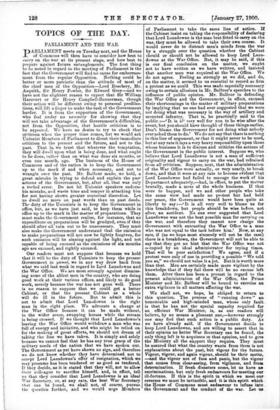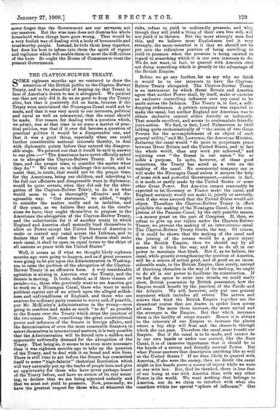TOPICS OF THE DAY.
PARLIAMENT AND THE WAR.
PARLIAMENT meets on Tuesday next, and the House of Commons will then have to consider how best to carry on the war at its present stage, and how best to prepare against future entanglements. The first thing to be noted in regard to the meeting of Parliament is the fact that the Government will find no cause for embarrass- ment from the regular Opposition. Nothing could be better or more patriotic than the attitude of most of the chief men of the Opposition—Lord Rosebery, Mr. Asquith, Sir Henry Fowler, Sir Edward Grey—and we have not the slightest reason to expect that Sir William Harcourt or Sir Henry Campbell-Bannerman, though their action will be different owing to personal predilec- tions, will lift a finger to make the task of the Government harder. It is from the supporters of the Government, who feel under no necessity for showing that they will not take advantage of the Government's difficulties, not from the Opposition, that hostile criticism is to be expected. We have no desire to try to check that criticism when the proper time comes, but we would ask Unionist Members of Parliament to direct their immediate criticism to the present and the future, and not to the past. That is, we trust that whatever the temptation, they will dwell upon what is being done, and what ought to be done, rather than on what was done six months, or even one month, ago. The business of the House of Commons and of the nation is to keep the Government up to the mark if and when necessary, and not to wrangle over the past. Mr. Balfour made, we hold, a great mistake in trying to defend and explain the past actions of the Government, but, after all, that was only a verbal error. Do not let Unionist speakers endorse his mistake, and waste time and temper in attacking him for not having shown greater oratorical discretion. Let us dwell no more on past words than on past deeds. The duty of the Unionists is to keep the Government in office, but, as we have just said, to keep them while in office up to the mark in the matter of preparations. They must make the Government realise, for instance, that no expenditure on preparations will be grudged, even if they should after all turn out to be unnecessary. They must also make the Government understand that the omission to make preparations will not now be lightly forgiven, for such omission will be sinning against the light, and not capable of being excused as the omissions of six months ago are excused, and rightly excused.
Our readers must not suppose that because we hold that it will be the duty of Unionists to keep the present Government in power, we in any way draw back from what we said last week in regard to Lord Lansdowne and the War Office. We are most strongly against dismiss- ing some of the ablest men in the country, who are doing good work at their various offices, and likely to do good work, merely because the war has not gone well. There is no reason to suppose that we could get a better Cabinet, or that the present Cabinet as a whole will do ill in the future. But to admit this is not to admit that Lord Lansdowne is the right man in the right place. We advocate a change at the War Office because it can be made without, in the wider sense, swapping horses while the stream is being crossed. If we thought that Lord Lansdowne's leaving the War Office would withdraw a man who was full of energy and initiative, and who might be relied on for the making of great efforts, we should not dream of taking the line we have taken. It is simply and solely because we cannot feel that he has any true grasp of the military needs of the nation that we have spoken out. The Government as yet have shown no sign, and therefore we do not know whether they have determined not to accept Lord Lansdowne's offer of resignation, which we may presume has been tendered or as good as tendered. It they decide, as it is stated that they will, not to allow their colleague to sacrifice himself, and, in effect, tell us that they consider that Lord Lansdowne is an ideal War Secretary, or, at any rate, the best War Secretary that can be found, we shall not, of course, pursue the question further, and we would urge Members of Parliament to take the same line of action. If the Cabinet insist on taking the responsibility of declaring that Lord Lansdowne is the man best fitted to carry on the war, they must be allowed to take their own course. It would never do to distract men's minds from the war by a struggle over the question whether the Cabinet should or should not be allowed to keep Lord Lans. downe at the War Office. But, it may be said, if this is our final conclusion on the matter, we ought not to have written as we have written, and insisted that another man was required at the War Office. We do not agree. Feeling as strongly as we did, and do, on the matter, it seemed to us essential to record as firm a protest as we could This was made especially necessary owing to certain allusions in Mr. Balfour's speeches to the influence of public opinion. Mr. Balfour in defending the War Office and the Government, in effect, excused their shortcomings in the matter of military preparations by implying that no one had ever suggested that we were not doing what was necessary in the way of artillery and mounted infantry. That is, he practically said to the public :—` It is all very well for you to be wise after the event, but you should have thought of these things earlier. Don't blame the Government for not doing what nobody ever asked them to do.' We do not say that there is nothing in this line of argument, or that it ought never to be used, but at any rate it lays a very heavy responsibility upon those whose business it is to discuss and criticise the actions of the Government in the public interest. Suppose we, who • believe that Lord Lansdowne is not a man of sufficient originality and vigour to carry on the war, had refrained from all criticism. Suppose, next, that the administration of the War Office were actually, or very nearly, to break down, and that it were at any rate to become evident t hat Lord Lansdowne had failed to manage the work of his Department adequately,—had, in effect, to put the matter brutally, made a mess of the whole business. If that were to happen, and we and other people who take the same view had made no protest but had held our peace, the Government would have been quite at liberty to say :—'It is all very well to blame us for this breakdown, but people should be wise before, not after, an accident. No one ever suggested that Lord Lansdowne was not the best possible man for carrying on the war, and therefore they cannot now charge the Government with entrusting the War Office to a man who was not equal to the task before him.' Now, at any rate, if (as we hope most sincerely will not be the case) there is a breakdown, the Government will not be able to say that they got no hint that the War Office was not oi'cupied by an ideal administrator for trying times. That will be poor satisfaction ? We agree, and if a protest were only of use in providing a possible " We told you so," we should not value it a jot. But it is worth more than that. Men are certainly made more vigilant by the knowledge that if they fail there will be no excuse left them. After there has been a protest in regard to the present administration of the War Office, the Prime Minister and Mr. Balfour will be bound to exercise an extra vigilance in all matters affecting the war.
We shall not, we hope, be obliged to return to this question. The process of " running down " an honourable and high-minded man, whose only fault . is that he has not the special capacity required for an efficient War Minister, is, as our readers will believe, by no means a pleasant one,—however strongly one may feel that such action is a public duty. As we have already said, if the Government decide to keep Lord Lansdowne, and are willing to assert that in their opinion no better War Secretary can be found, the only thing left is to acquiesce in that opinion, and to give the Ministry all the support they require. They must be assured that what the country wants from them is not explanations about the past, but vigour for the future. Vigour, vigour, and again vigour, should be their motto, —and the vigour not of fuss and panic, but the vigour that comes from clear-seeing, from vigilance, and from determination. If fresh disasters come, let us have no recriminations, but only fresh endeavours for meeting our ill-fortune. If this is the spirit in which we meet our reverses we must be invincible, and it is this spirit which the House of Commons must endeavour to infuse into the Government and the conduct of the war. Let us never forget that the Government are our servants, not our masters. But the wise man does not dismiss his whole household when things have gone wrong. That would be a very foolish way of dealing with a body of honourable and trustworthy people. Instead, he bids them keep together, but does his best to infuse into them the spirit of vigour and vigilance which will enable them to meet the difficulties of the hour. So ought the House of Commons to treat the present Government.



















































 Previous page
Previous page